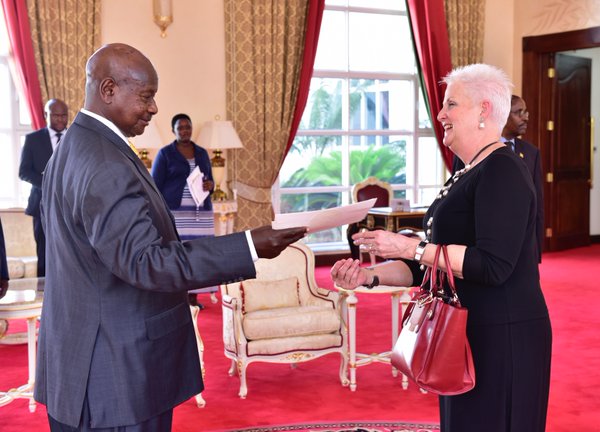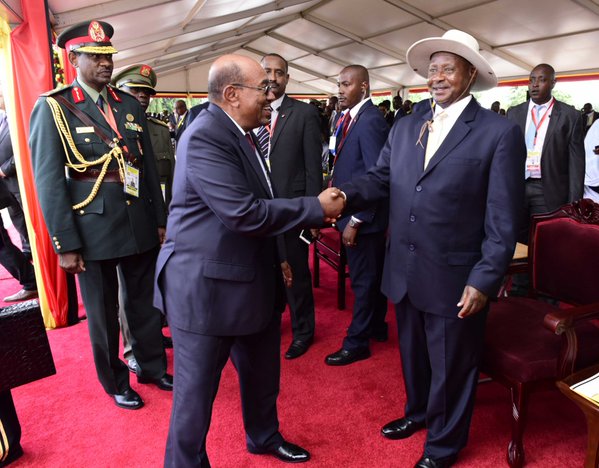America versus Museveni
Can someone be defined by their hair? Possibly, in the case of U.S ambassador to Uganda, Deborah Malac. As President Yoweri Museveni discovered recently at his most recent swearing-in ceremony, Malac can be as edgy, unconventional, and anti-establishment as her low cut punky blonde head.

On May 12, Malac and the U.S Principal Deputy Secretary of State for African Affairs, Bruce Wharton, joined their European Union and Canadian delegations in an unprecedented walk-out from the ceremony. It was the second time since her arrival in Uganda in February that Malac was aggressively wading into Uganda’s politics and directly in Museveni’s face.
The next day, however, the duo spoke to journalists in tones that were surprisingly relatively mild.
“The United States values its relationship with Uganda,” Wharton stated and the interpretation of any looking at the walk-out as an indication of sharp exchanges ahead quickly subsided.
The government Deputy Spokesperson Col. (Rtd) Shaban Bantariza immediately told The Independent that “the back and forth is standard practice between nations”.
“You saw after the walk out, he (Wharton) called a press conference and said we are still friends and he cherished the cooperation between the two nations. When you look at that after the walk out, is that really an expression of hostility?” he asked.
By the time Wharton was talking of how Uganda and the U.S. “cooperate closely on a number of important issues, and together we have accomplished a great deal in the areas of health, education, and security – areas that directly benefit the well-being of Ugandans across the country”, it was back to business as usual.
So what was the walk-out about?
Ambassador Malac refused to answer this question directly when asked by The Independent a few days after the incident.

But Christopher J. Brown, the spokesperson of the U.S. embassy in Kampala, repeated the explanation offered earlier by Wharton.
He said: “The U.S. delegation made the decision to walk out of the swearing in ceremony for two reasons. The first was the presence at the event of President Bashir, who has outstanding warrants against him from the ICC for genocide and other atrocities in Darfur. The second reason was President Museveni’s disparaging comments against the ICC, which were truly unfortunate given Uganda’s obligations as a signatory to the Statue of Rome.
“Our decision to depart was meant to signal our strong disagreement with both President Bashir’s presence and President Museveni’s comments.”
Brown too concluded: “I will emphasize, however, that despite these disagreements, the United States wants to maintain a relationship with Uganda”.
Back-door deals crash
The Independent has learnt, however, that although the Western diplomats could not have predicted President Museveni’s “disparaging comments”, they arrived at the Kololo ceremony after carefully mulling over how to deal with Bashir’s presence.
Highly placed sources in the Uganda government, speaking on condition of anonymity, have told TheIndependent that there had been discussions between the Ugandan government and the diplomatic community on how the issue of Bashir’s presence would be handled.
Apparently, it had been agreed in negotiations that the diplomatic community would not interface with Bashir at all. The diplomats would find a way to leave the venue without attracting attention.
However, when President Museveni made the statements against the ICC, it appears the diplomats saw it as some sort of breach of agreement. Museveni used the same occasion to praise Chinese and Russian delegates as “genuine friends, who are respectful of Uganda unlike the Americans”. He berated the Americans for unwarranted interference. Although he interspersed his criticism of the Americans in local dialects, he nonetheless made his point.
Ambassador James Mugume, the Permanent Secretary, Foreign Affairs told The Independent, however, that there are many in Washington who feel that the walkout was uncalled for.
He also pushed a line that appears to have been crafted by the Museveni government as a way of swinging the spot-light off Uganda by framing the walk-out as an “insult to Africa”.
“This had not much to do with Uganda— US relations but rather Africa and US’s desire to control it,” Mugume said, “As you are aware, the position of Africa on the ICC is not any different from what President Museveni made clear. Several African countries have said they will leave the ICC.”
So, Mugume added, the walkout is not seen as against Uganda but against Africa as a whole and many find it strange given that America had given a green light to sign the statute under Clinton (Bill Clinton) and then pulled out.
 The Independent Uganda: You get the Truth we Pay the Price
The Independent Uganda: You get the Truth we Pay the Price





